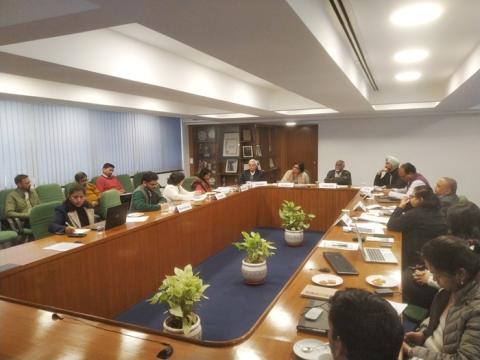COP28 delivered, but what happens in the next COP will matter

Renowned experts delve into key decisions, financial allocations, and global adaptation strategies for a sustainable future
New Delhi, January 17, 2024: The Energy and Resources Institute (TERI), hosted a discussion on the outcomes of COP28 and way forward for COP29 on Tuesday.
In the opening remarks, Dr Vibha Dhawan, Director General, TERI, emphasized the need to prioritize the initiatives necessary to be undertaken between the COPs, stating "we are still not talking about what action must be taken. What do we expect between this COP28 and the next one has not been discussed to that detail.” Dr Dhawan highlighted the urgent need for action on decisions.
Mr RR Rashmi, Distinguished Fellow, TERI, highlighted some of the key decisions made at COP28, including decisions made on the Loss and Damage Fund, the Global Stocktake, and the Global Goal on Adaptation, noting that there are still modalities to each that need to be determined. On Loss and Damage, Mr Rashmi noted the need to further determined who is covered and what would be the definition of vulnerability moving forward.
Ms Rajashree Ray, Economic Advisor, Ministry of Environment, Forest, and Climate Change, elaborated on the work that goes on behind-the-scenes at the COP meetings and the road ahead to future COPs. She said, “Decisions on climate finance were only intermediary. We would look to COP29 as a finance focused COP where a landmark decision on the New Collective Quantified Goal on climate finance is expected to be adopted.” Ms Ray underscored the necessity of intensified attention to adaptation strategies, at both the global and local levels. She pointed out that the current GGA decision text lacks robust language on the means of adaptation, and that future COPs will need to solidify indicators for greater clarity.
Sharing her point of view on the subject, Dr Ritu Mathur, Consultant, NITI Aayog, said that boundaries between mitigation and adaptation actions are increasingly becoming blurred which thereby raises the question of resource allocation to different sectors aligned with their growth aspirations and development needs. She further added that "domestic challenges need to be reflected in the revision of the NDCs and the long-term strategies". Moving forward, she focused on the need for developing taxonomies and having a bottom-up, cross-cutting, and inter-sectoral approach when updating NDCs.
Dr Prodipto Ghosh, Distinguished Fellow, TERI, led the panel discussion on the GGA by highlighting how adaptation is far more complex than mitigation in terms of setting targets and measuring progress, and that adaptation finance has so far predominantly been from public finance sources. Dr Ghosh emphasized that, moving forward, decisions on adaptation measures and the GGA need to align with mitigation action trajectories as both are two sides to the same coin.
Mr Harijit Singh, Global Engagement Director, Fossil Fuel Non-Proliferation Treaty Initiative, highlighted the need for further clarity on decisions made on adaption at COPs, noting that there is lack of a roadmap for doubling of adaptation finance. Mr Singh also noted the need for adaption focused local level plans at the state/district level. He stated that, “It is in India’s own interest to focus more on adaptation at the local level, via national and state level adaptation plan.”
Mr Arun Krishnan, Programme Manager, Climate Policy Initiative, highlighted barriers to accessing climate finance for adaptation which include the lack of institutional capacities to mediate, long wait time in getting funding from GCF and the lack of standardization of projects. Mr Krishnan stated that, “Quantum of finance required for adaptation is more difficult to compute than it is for mitigation”. He concluded by highlighting the need for accounting for additionality in adaptation finance.
Significantly emphasizing the appropriateness of adaptation as a form of development, Mr Shashikant Chopde, Senior Research Associate at the Institute for Social and Environmental Transition–International, pointed out the robust connections between adaptation measures and the Sustainable Development Goals (SDGs). He proposed that financial allocations for adaptation measures could be implemented through Missions in India, advocating for a bottom-up approach.
Ms Suruchi Bhadwal, Senior Fellow, TERI, stressed that the decisions on the GGA finally recognize adaptation as a global challenge which needs global solutions. She noted that is important to highlight the business case for adaption to the private sector to encourage further mobilization of finance and that companies would need to adapt their value chains to the increasing climate risks and vulnerabilities.
The discussion was organized as a research activity at TERI carried out under a grant from the Bloomberg Philanthropies.

